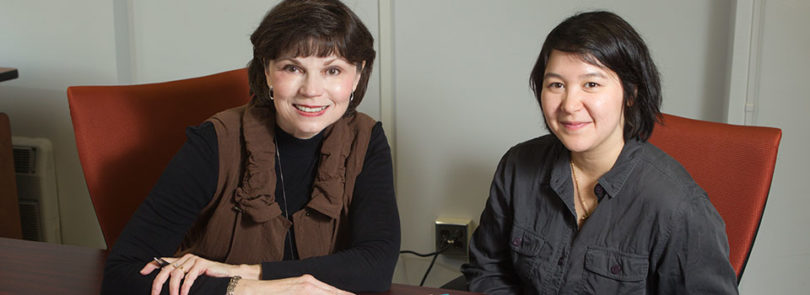Trisha Reeves, associate professor in the School of Social Work, uses the classroom experience to demonstrate how knowledge derived from research informs new understandings of human behavior.
Where did you earn degrees and what are your current responsibilities at UGA?
I earned a bachelor’s degree in family and children’s services from Auburn University, a master’s of social work from the University of Alabama, and a Ph.D. in adult education from UGA. Currently, I am an associate professor in the School of Social Work and serve as the director of the dual degree master’s program (master’s of social work/master’s of public health) with the College of Public Health.
When did you come to UGA and what brought you here?
I moved to Athens after marrying a UGA professor, so you could say that love brought me to this community. The realization that I needed to know more as a practicing social worker, particularly in the area of research methods, prompted my return to higher education—almost two decades post-master’s degree—to earn a Ph.D. I became a member of the School of Social Work faculty in 2000.
What are your favorite courses and why?
That is a hard one! I favor introductory courses because they are uniquely positioned, by virtue of their entry-level status, to ignite students’ interest in the topics, often to their surprise. I have been able to teach courses that are a good fit for my particular areas of interest—life span development, human behavior theory, health care social work and qualitative research methods. I hope students in whatever class I’m teaching believe their class is my favorite one.
What interests you about your field?
Social work, more so than most disciplines, recognizes the inextricable link between individuals and their environment. I find human behavior endlessly fascinating, largely because of my inherently curious nature about people and the world around me. Also, the core values of the social work profession—service, social justice, dignity and worth of the person, importance of human relationships, integrity and competence—align with my personal values, which means I have the opportunity each and every day to engage in work that I find gratifying personally and professionally.
What are some highlights of your career at UGA?
I was selected to be a Lilly Teaching Fellow early in my academic career. This remarkable experience, coupled with the mentorship provided by Sylvia Hutchinson, instilled a passion for teaching. In 2010, I was inducted into UGA’s Teaching Academy. An equally meaningful highlight was when the first-year Ph.D. students in the School of Social Work presented me with the framed certificate, “Professor Students Most Wanted as a Parent.” As someone who married later in life and does not have children, I was deeply touched by this gesture.
How does your research or scholarship inspire your teaching, and vice versa?
Zora Neale Hurston, one of my favorite authors, is credited with describing research as “formalized curiosity … poking and prying with a purpose.” The purpose of research, to my way of thinking, is use; it isn’t enough for my curiosity to be satisfied. Because much of my research has theoretical implications, I am able to use the classroom experience to demonstrate how an extension of theoretical knowledge informs new understanding of a phenomenon. Take human behavior, for example. While most people find it an interesting topic, they view theory about human behavior less so. When I can show how research expands theoretical understanding of real-world issues in social work practice (e.g., coping with chronic illness), the connection between research and practice becomes real for students, which leads to greater interest in both.
What do you hope students gain from their classroom experience with you?
Aside from the obvious goal of wanting students to be more knowledgeable about the subject matter, I want them to be inspired to think about it from different perspectives. I hope my passion for the topic translates into their continued interest in it so that, paradoxically, the end of our semester together signals the beginning of their own self-directed journey of discovery.
Describe your ideal student.
My ideal student is one who is driven by a thirst for knowledge, as clichéd as that sounds. And all teachers know when they encounter this student. Motivated by the joy of learning, this student unhesitatingly questions the world around him or her and delights in a lively exchange of ideas. I encourage all students in my classes to meet with me outside of the classroom, and this student is among the first to do so. Not surprisingly, I remain in contact with this student long after the semester ends.
Favorite place to be/thing to do on campus is …
… walking our dogs, a miniature Australian shepherd and a West Highland terrier, through the main part of campus, especially on a beautiful autumn or spring day. Slipping over to the UGA Trial Garden during lunch is right up there, too.
Beyond the UGA campus, I like to …
… spend time with family and friends, and to travel. Both give testament to my belief that relationships and life experiences give substance and meaning to life.
Community/civic involvement includes …
… volunteering as a Georgia master gardener and, most recently, Westie adoption and rescue. I have an abiding interest in politics, which stems from the two summers I spent as a congressional intern/caseworker during my undergraduate years at Auburn University. I plan to be more directly involved in local and state politics.
Favorite book/movie?
My favorite book is “To Kill a Mockingbird,” and my favorite movie is “The Shawshank Redemption.” Both speak to the importance of moral courage and the power of the human spirit. It seems that the books and movies cited as favorites or most influential are often those that help us understand who we are, and may become. With a remarkable gift for narration, Harper Lee in “Mockingbird” captured the children’s precocious observations about race, class and adult behavior in a way that resonated with my own experience growing up in rural Alabama during this same decade.
Proudest moment at UGA?
My proudest moment was when I became a promoted and tenured associate professor. I have enormous respect for my colleagues in the School of Social Work, and their affirmation meant a great deal to me.
Is there anything else you’d like to add?
I have a lifelong affection for dogs … all sizes, all varieties. The protective factors—biologically, psychologically and socially—afforded by the human-animal bond is something I witness each and every day. This will be a focus in the next chapter of my life … in a way I have yet to work out!








